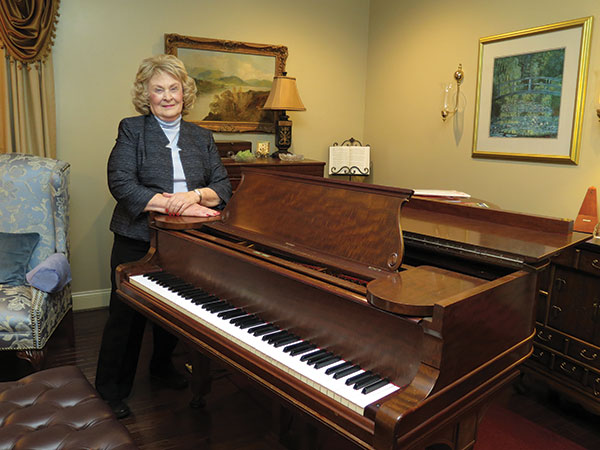
From banana pudding to teaching and beyond
Story by Leigh Pritchett
Photos by Graham Hadley
Dr. Betty Cosper and her dog, Bama, ushered their visitor into their kitchen to give the person a large container of banana pudding.
Just that morning, Dr. Cosper had made the pudding from scratch.
Giving gifts of food is part of her daily routine, according to son-in-law Art Meadows of Pell City. “This woman … is non-stop cooking for everyone. … She shops five days a week because she makes food for everyone in the county and especially during the holidays. Did I say she makes a mean banana pudding?”
That banana pudding – made from a recipe Dr. Cosper developed herself – has quite the reputation.
“She makes the best banana pudding I’ve ever tasted!” said her pastor, Dr. John Thweatt of First Baptist Church in Pell City.
Dr. Cosper said she learned to cook by watching her mother and two other ladies who all had exceptional culinary abilities. “My mother could cook anything. … I cook old-timey. People don’t cook like that anymore. It’s just fun. … I spend a lot of time cooking and giving it away. … It makes people happy.”
 Just ask Harry Charles McCoy of Pell City.
Just ask Harry Charles McCoy of Pell City.
“She’s my real good friend!,” he said. “… Every Christmas, she always bakes me a strawberry cake. She really knows how to bake a cake.”
Theirs is a friendship that began many years ago when McCoy was making deliveries for an antique store that was run by the late Josephine Bukacek Kilgroe. The friendship grew as Dr. Cosper later taught McCoy’s children and grandchildren in school. “She’s a mighty sweet lady,” McCoy said.
Yet, the ability to produce scrumptious edibles is not the attribute for which Dr. Cosper wants to be known. Instead, she wants her legacy to be her contribution in the field of education.
“That’s where my love is,” she said.
For 40 years, she was an educator, instructing infants to college students and every age in between. She has taught early childhood, elementary, middle school and high school, and she has been an assistant principal, principal, college instructor and director of continuing education.
Her career has encompassed Avondale School, Pell City High, Walter M. Kennedy Intermediate, Coosa Valley Elementary, St. Clair County Child Care Program, Talladega County schools, Jacksonville State University, Gadsden State Community College and Jefferson State Community College. In addition, she worked in the junior college division of the Alabama Department of Education in Montgomery.
For her work, she was inducted into Delta Kappa Gamma, received a “Service to Education” award from Coosa Valley Elementary in 1997 and was included in Who’s Who among America’s Teachers in 2005-2006.
On April 12 is a reception for another recognition Dr. Cosper is receiving. Dr. Cosper is being given a Chair of Foundation in her honor to celebrate her contribution to students in the Pell City School System. Her son, Bill Cosper Jr. of Cropwell, and Dr. Cosper’s friend, Cindy Goodgame of Pell City, have spearheaded the Chair of Foundation donations effort. The donations from that effort benefit the work of Pell City Schools Education Foundation. The reception for Dr. Cosper is 6 p.m. to 8 p.m. at the Center for Education and Performing Arts in Pell City.
Always a planner
Dr. Cosper, whose parents were Joe and Roberta Ingram, lived in Birmingham until second-grade, when her family moved to the Easonville area. She graduated from Pell City High School.
From the University of Montevallo, she earned her bachelor’s and master’s degrees. She completed other graduate courses at Samford University. In the 1980s when Dr. Cosper was working on her doctorate at the University of Alabama, her mother traveled to Tuscaloosa with her for the night classes. Mrs. Ingram quickly became a class favorite because of the home-baked goodies she would take to share.
Dr. Cosper’s doctoral dissertation, titled An Analysis of Relationships between Teacher Effectiveness and Teacher Planning Practice, shows her penchant for planning, managing and administering. In presentations nationwide and at an international meeting in Washington, D.C., she revealed the findings of her research.
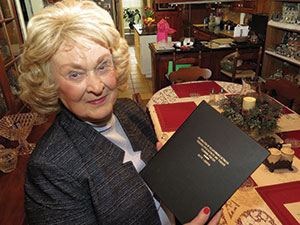 “I’m a planner. … I got that from my parents: No matter what you do, you’re supposed to be prepared,” she said. “… To accomplish anything, you have to set goals and then take steps to achieve these goals. I feel that a good place to begin is in God’s Word.”
“I’m a planner. … I got that from my parents: No matter what you do, you’re supposed to be prepared,” she said. “… To accomplish anything, you have to set goals and then take steps to achieve these goals. I feel that a good place to begin is in God’s Word.”
She pointed specifically to Colossians 3:12-14, verses in the Holy Bible about showing kindness, mercy, humility, forgiveness and love.
Through her work with Cosper Management Consulting, Inc. she also conveyed to adults in business settings the importance of making preparations and setting goals.
“No matter what kind of business you’re in, you’ve got to plan,” she said.
Having a plan was essential in her busy life as a single parent raising four children, teaching school and engaging in several side ventures to supplement income. In fact, she earned her master’s degree while her children – Betty Ann Dennis (who died in 2017); Debbie Fletcher of Austin, Texas; Carol Meadows of Pell City, and Bill – were still at home.
For many, many years, she taught school all day and then gave piano lessons in the afternoons and evenings. She was teaching as many as 60 piano students a week.
Meadows noted that some of Dr. Cosper’s piano students have performed at Carnegie Hall and in concerts around the world.
Hunter Shell, a current student at Jacksonville State University, said the musical training he got from Dr. Cosper helped him to receive a full music scholarship.
When not teaching piano students the intricacies of music, Dr. Cosper might have been painting oil portraits for photography studios.
Or she might have been selling antiques. In her home, she operated Colonial House Antiques.
Meadows said the Cosper children might come home from school to find that the bed on which they slept the previous night had been sold.
“The whole house was a museum of beautiful furniture and cut glass with several different china patterns that were prized possessions, but not above being sold to clothe and feed the brood,” Meadows explained.
Despite having a full-time job and other business ventures, Dr. Cosper made clothes for her children and draperies for her home.
“I was busy. I was really busy,” Dr. Cosper said, remembering those days.
Her busy-ness has been a constant through the years.
In her home, she has done the interior painting, the decorating and flower arranging. She refinished boards from an old house that may have quartered soldiers during a war and used the planks to floor the dining area of her kitchen.
The large and intricate needlepoint pieces hanging in her formal dining room – well – those are her handiwork, too.
For a time, she also was a pianist and Sunday school teacher at First Baptist Church in Pell City.
Even now as a retiree, she is still a dynamo.
She teaches piano lessons and exercises six days a week at Snap Fitness. When she is not cooking and baking and giving away food, she is working in her yard.
“At a stage of life when many choose to stop, Dr. Cosper continues to press on,” said Thweatt. “Every time I drive by her house, I see her pushing a wheelbarrow, swinging a pickaxe, or doing something else in her yard. I’d stop to help, but I’m not sure I could keep up with her.”
For Dr. Cosper, just to dust her Christmas Village collection would take quite a while because the pieces encompass four rooms of her house. Her Christmas tree stays up all year because “every day is Christmas. That’s what it’s all about,” she said.
Regardless of her seemingly endless flurry of activity, she always has time to talk about the joys of her life – her children and five grandchildren. “The Good Lord has been so good to me,” she said.
Dr. Cosper’s thirst for knowledge has not waned either. “We’re never too old to learn,” she said. “That is scientific.”
Why, she has been known to check out from the library as many as 30 books at a time. Recently, she started learning through traveling.
In 2017, Dr. Cosper made her first trip out of the country, said Deanna Lawley of Pell City, who coordinates the travel group Friends Bound for New Horizons. So far, Dr. Cosper has been to Italy and Germany and is preparing for her third trip abroad.
On the trips, Mrs. Lawley has watched how Dr. Cosper “absorbs the arts and music” in foreign lands and cultures. “Dr. Betty is amazing to me. … She is truly the definition of a life learner.”
Traveling with Mrs. Lawley’s group is a natural fit for Dr. Cosper because one purpose of the trips is to raise funds for the Pell City Schools Education Foundation. That foundation funds teacher grants for in-classroom needs.
A friend& mentor to many
Former students and coworkers, and many others, like to reminisce with Dr. Cosper or to seek her advice. That fact can sometimes turn a brief stop at Wal-mart into a three-hour visit for Dr. Cosper because so many individuals want to talk to her.
Keith White, a former coworker, very much appreciates Dr. Cosper’s friendship and guidance.
When White was a young art teacher at Coosa Valley Elementary, Dr. Cosper was one of his mentors. “She knew my Dad (the late Ernest White) well,” said White.
The fact that he and Dr. Cosper both shared artistic and musical talents strengthened their friendship even more.
Although White now lives in Alabaster, he comes to visit her to get “motherly advice. … Ever since my mother (Alice White) died, I think (Dr. Cosper and I) have an even closer bond. She’s almost my second mother. I really cherish it.”
John “Butch” Lonergan, who taught art at Pell City High from 1968-1991, said Dr. Cosper was his third- and fourth-grade teacher. As such, she was his first formal art instructor.
Lonergan said Dr. Cosper would put poster-board frames around the students’ art pieces, making the creations look professional.
“She influenced me a lot by talking about my work,” Lonergan said. “… She was one of my favorite teachers.”
Lonergan added that the boys in the class thought Dr. Cosper was pretty. “All the boys were crazy about her.”
Dr. Cosper’s influence extends well beyond piano lessons, art appreciation and culinary talents. As an elementary student, Shell said he struggled with pronouncing words, reading and writing. Dr. Cosper began to work with him and, within a year, Shell was a reading whiz.
Shortly thereafter, Shell’s parents let him start taking piano lessons from Dr. Cosper.
“She pushed me more than anyone else in my life,” Shell said of the years Dr. Cosper taught him music lessons. “On top of that, I learned how to be happy from Dr. Cosper. If I came into a lesson feeling anything but happy, she figured out a way to make me smile. I learned quickly that life is too short to be angry all the time.”
Dr. Cosper reminisces, too, about school days, which included getting to teach her children, Bill and Carol, when they were in sixth-grade. Often, the school stories Dr. Cosper tells end with her smiling or laughing.
“I had the privilege of teaching with Mrs. Iola Roberts the first year,” Dr. Cosper said, recalling her first teaching position. Roberts was an icon in education in Pell City, and one of the elementary schools bears her name. “I taught third-grade (at Avondale School), and she was my principal. Everyone should have taught under her. Wow!”
Dr. Cosper said she never even applied for the teaching job. She just went to Mrs. Roberts’ house for an interview.
“Every year, (Mrs. Roberts) wrote a play,” Dr. Cosper continued. “The Comers (who operated Avondale Mills) would come. The whole Mill Village would turn out; the governor, the mayor. … I had to do all the music,” paint the flats and draw plans for the backdrop.
When Dr. Cosper talks about her school and piano students – what they did then, what they are doing now – a glow inevitably appears on her face.
Each time a former student tells her the influence she had in that person’s life, “I just have to give the Good Lord credit,” she said. “I’m so glad He directed me to teaching. … I am so thankful and happy that I had and have the chance to teach many students – all sizes and ages. Once a teacher, always a teacher.”











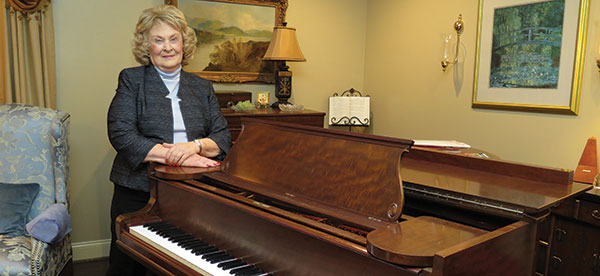
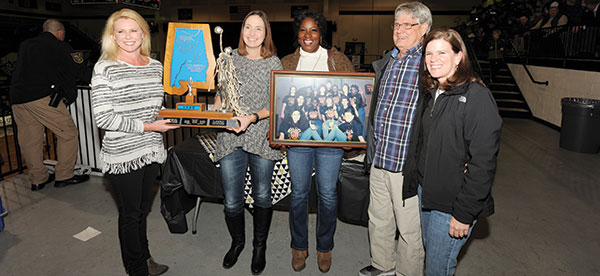
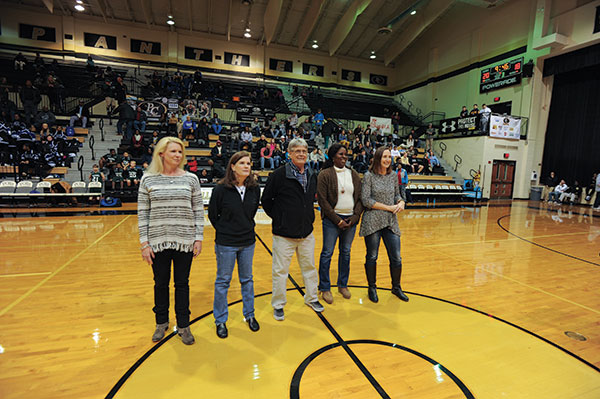
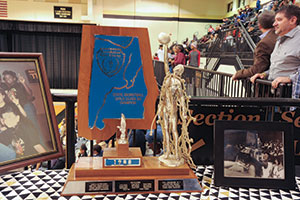 And looking back, some call it “amazing,” others compare it to a fairy tale. But Tonya Tice Peoples, who came to Pell City from Lawrence County when her Dad, Mike Tice, became Pell City’s head football coach and hired Slater as the girls’ hoops coach, puts it more simply:
And looking back, some call it “amazing,” others compare it to a fairy tale. But Tonya Tice Peoples, who came to Pell City from Lawrence County when her Dad, Mike Tice, became Pell City’s head football coach and hired Slater as the girls’ hoops coach, puts it more simply: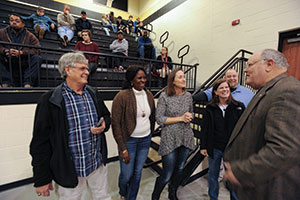 Like Slater, Tonya Tice Peoples became a teacher and coach. After working in NASCAR, Danielle Fields Frye is director of community engagement for the United States Auto Club (USAC) and lives with her husband and two daughters outside Indianapolis. Melissa Purvis McClain is an engineer. Erica Collins Johnson, like McClain, is still in Pell City. Alicia Moss Ogletree and Kathy Vaughn – a distinguished military veteran — are still in the area as well. April Hughes is in the fashion industry in New York.
Like Slater, Tonya Tice Peoples became a teacher and coach. After working in NASCAR, Danielle Fields Frye is director of community engagement for the United States Auto Club (USAC) and lives with her husband and two daughters outside Indianapolis. Melissa Purvis McClain is an engineer. Erica Collins Johnson, like McClain, is still in Pell City. Alicia Moss Ogletree and Kathy Vaughn – a distinguished military veteran — are still in the area as well. April Hughes is in the fashion industry in New York.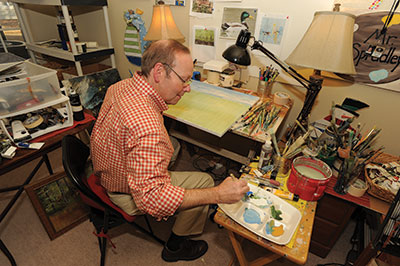
 “It is our honor to decorate our home state tree and help the nation celebrate the holidays in one of our most recognizable parks,” said Valerie White, director of Heritage Hall Museum. “We are all excited to be part of the ‘America Celebrates’ display. It gives us an opportunity to show our pride in our state’s artistic talent, stunning natural wonders and vibrant cultural heritage.”
“It is our honor to decorate our home state tree and help the nation celebrate the holidays in one of our most recognizable parks,” said Valerie White, director of Heritage Hall Museum. “We are all excited to be part of the ‘America Celebrates’ display. It gives us an opportunity to show our pride in our state’s artistic talent, stunning natural wonders and vibrant cultural heritage.”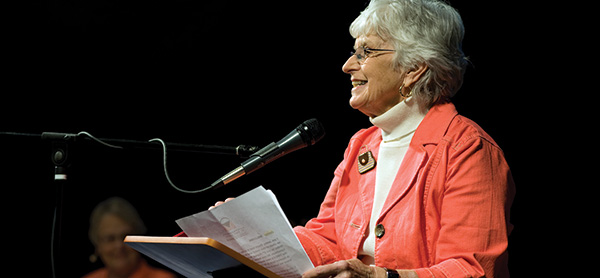
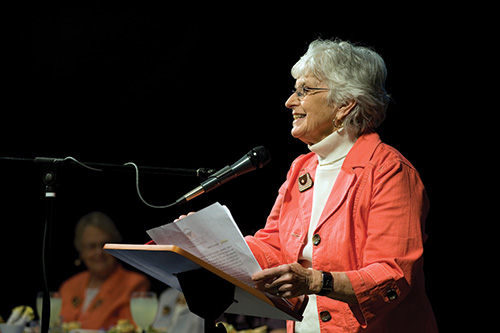
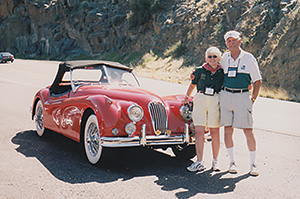 “She loved people and loved making people happy,” the Rev. Shafer said of her mom.
“She loved people and loved making people happy,” the Rev. Shafer said of her mom.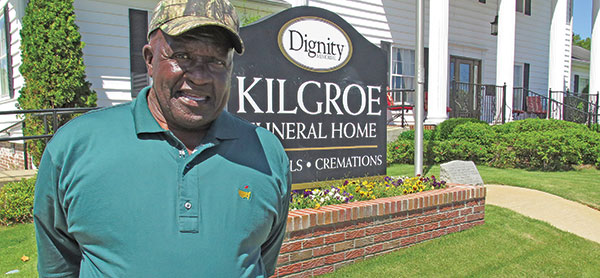
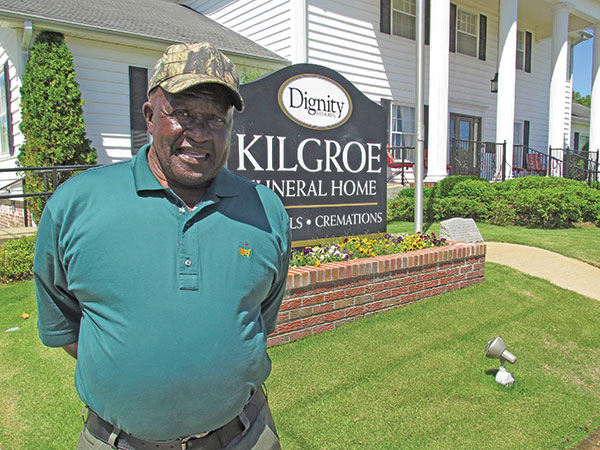
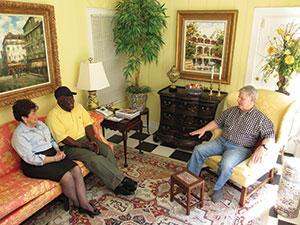 Harry Charles was 9 when his father, Blois McCoy, died at the age of 37, leaving his mother, Josephine McCoy, with eight children to raise. Vowing to aid his mother, Harry Charles stepped up to help for the first of countless times, going to work doing odd jobs around town and at the Lee Motel, where his mother was employed.A 12-year-old Harry Charles was cutting grass at the motel when a friend of the Kilgroe family asked him if he’d like another job. “I said, ‘Yes ma’am.’ That was 1962, and I’ve been here ever since,” says Harry Charles.
Harry Charles was 9 when his father, Blois McCoy, died at the age of 37, leaving his mother, Josephine McCoy, with eight children to raise. Vowing to aid his mother, Harry Charles stepped up to help for the first of countless times, going to work doing odd jobs around town and at the Lee Motel, where his mother was employed.A 12-year-old Harry Charles was cutting grass at the motel when a friend of the Kilgroe family asked him if he’d like another job. “I said, ‘Yes ma’am.’ That was 1962, and I’ve been here ever since,” says Harry Charles.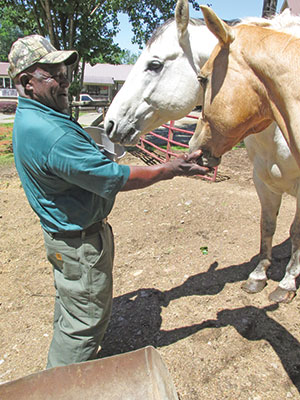 He grew up side by side with Sonny Kilgroe, who was a few years older and taught Harry how to do most every job at the funeral home. “We were always working together. He helped me, and I learned a lot. Mr. Sonny was like my brother,” Harry says. Sonny died in 2015. “I’ll never stop missing him.”
He grew up side by side with Sonny Kilgroe, who was a few years older and taught Harry how to do most every job at the funeral home. “We were always working together. He helped me, and I learned a lot. Mr. Sonny was like my brother,” Harry says. Sonny died in 2015. “I’ll never stop missing him.”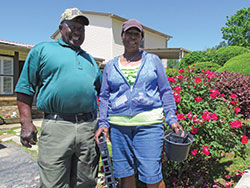 Jane Kilgroe recalls that when she and Sonny were about to get married, Sonny was so nervous that Harry Charles packed Sonny’s suitcase for the honeymoon. “That’s how close they were,” Jane says.
Jane Kilgroe recalls that when she and Sonny were about to get married, Sonny was so nervous that Harry Charles packed Sonny’s suitcase for the honeymoon. “That’s how close they were,” Jane says.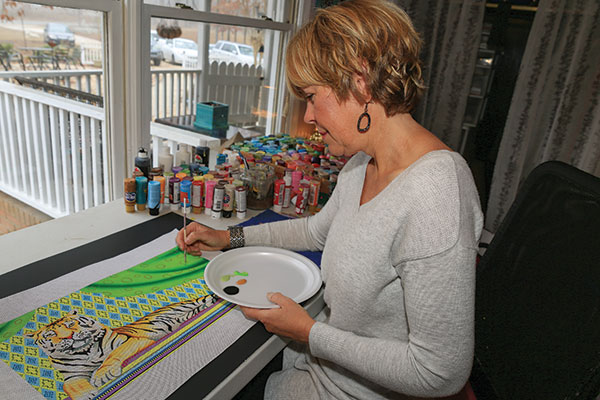
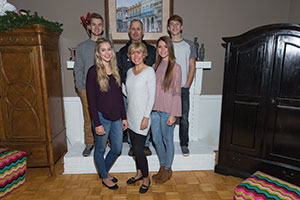 Marie and her parents lived with grandparents in the countryside in a home without indoor plumbing.
Marie and her parents lived with grandparents in the countryside in a home without indoor plumbing.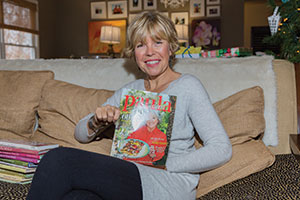 From the large floral acrylic on canvas that accents her dining room to the vibrant needlepoint pillow she had just finished, all her pieces show her penchant and flare for color.
From the large floral acrylic on canvas that accents her dining room to the vibrant needlepoint pillow she had just finished, all her pieces show her penchant and flare for color.